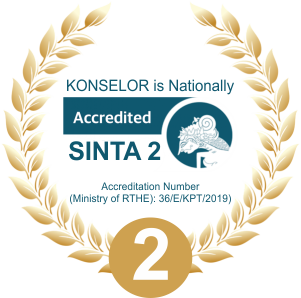Hubungan Kecanduan Game dengan Motivasi Belajar Siswa dan Implikasinya Terhadap Bimbingan dan Konseling
 ), Mudjiran Mudjiran(2), Herman Nirwana(3),
), Mudjiran Mudjiran(2), Herman Nirwana(3), (1) Universitas Negeri Padang
(2) Universitas Negeri Padang
(3) Universitas Negeri Padang
 Corresponding Author
Corresponding Author
Copyright (c) 2017 Konselor
DOI : https://doi.org/10.24036/02015446473-0-00
Full Text:
 Language : en
Language : en
Abstract
The research purpose to: (1) describe the game addiction on the student, (2) describe the student motivation, (3) find out the correlation between game addiction with student motivation. The research methodology was quantitative approach to the type of descriptive correlational. The research population was 739 students of SMP N 25 Padang academic year 2013/2014. The research sample was 266 students selected by stratified random sampling technique. The instrument used was a questionnaire with a reliability of 0.870 (game addiction) and 0.861 (learn motivation). Data were analyzed using descriptive statistical techniques and Product Moment Correlation. The research results showed that: (1) game addiction students in general are at the high category, (2) learn motivation students in general are at a high enough category, (3) there is a significant negative correlation between game addiction with students motivation, with a correlation coefficient of -0.301. Implications in guidance and counseling will discussed.
Keywords
References
Adams, E. 2010. Fundamentals of Game Desig (2nd ed). New York: New Riders.
Anderson, C.A., & Bushman, B.J. (2001). “Effects of violent games on aggressive behavior, aggressive cognition, aggressive affect, physiological arousal, and prosocial behavior: A meta-analytic review of the scientific literature”. Psychological Science. Vol. 12, No. 5.
Angela. (2013). Pengaruh Game Online terhadap Motivasi Belajar Siswa SD 015 Kelurahan Sidomulyo Kecamatan Samarinda Ilir. E-Journal Ilmu Komunikasi, (online), Vol 1, No 2, (http://ejournal.ilkom.fisip-unmul.ac.id/site/wp-content/uploads/2013/07/Jurnal.pdf, diakses 18 September 2013).
APJII. (2010). Rekutan Pengguna dan Pemakai Internet di Indonesia. (Online), (https://sites.google.com/site/aljannah27/perkembangan-bisnis-online-di-indonesia, diakses 15 Juli 2013).
Arizonanataliya, H., & Galih, H. (2013). “Game Shopping Time”. Jurnal Ilmiah Komputer dan Informatika (KOMPUTA), Vol. 2, No. 1
Asrori, M. (2007). Psikologi Pembelajaran. Bandung: Wacana Prima.
Bintang. (2010). Kecanduan Game. (Online), (http://mocca-chi.blogspot.com/2010/08/kenapa-kebanyakan-pria-yang-ketagihan.html, diakses 20 April 2015).
Dimyati., & Mudjiono. (2009). Belajar dan Pembelajaran. Jakarta: Rineka Cipta.
Djaali. (2007). Psikologi Pendidikan. Jakarta: Bumi Aksara.
Lee, E.J. (2011). A Case Study of Internet Game Addiction. Journal of Addiction Nursing, (Online), Vol. 22, (http://wpblog.uncfsu.edu/fsu_news/files/2012/01/Journal-of-Addictions-Nursing-Article-on-A-Case-Study-of-Internet-Game-Addiction.pdf, diakses 23 September 2013).
Lee, I., Chen, Y., & Holim, L. (2007). “Leaving A Never-Ending Game: Quitting MMORPGS and online gaming addicition”. Authors & Digital Games Research Association (DIGRA), hlm. 211-217.
Muhibbin, S. (2002). Psikologi Pendidikan dengan Pendekatan Baru. Bandung: PT. Remaja Rosdakarya.
Ngalim, P. (2007). Psikologi Pendidikan. Bandung: Sinar Baru Algesindo.
Padang Ekspres. (2014). 29 Mei. Kala ABG Kecanduan Game Online Bikin Lupa Makan dan Belajar serta 80% Pelajar Bermain Game. Hlm.13-14.
Price, H.O. (2011). Internet Addiction: Psychology of emotions, motivations and actions. New York: Nova Science Publishers, Inc.
Sardiman. A.M. (2012). Interaksi dan Motivasi Belajar Mengajar. Jakarta: Raja Grafindo Persada.
Young, K.S., & Abreu, C.N.D. (2011). Internet Addiction: A handbook and guide to evaluation and treatment. Canada: JohnWiley & Sons, Inc.
 Article Metrics
Article Metrics
 Abstract Views : 8709 times
Abstract Views : 8709 times
 PDF Downloaded : 8749 times
PDF Downloaded : 8749 times
Refbacks
- There are currently no refbacks.
Copyright (c) 2017 Konselor







